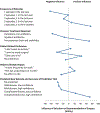Polygenic Risk Prediction in Diverticulitis
- PMID: 35876359
- PMCID: PMC10874245
- DOI: 10.1097/SLA.0000000000005623
Polygenic Risk Prediction in Diverticulitis
Abstract
Objective: To derive and validate a polygenic risk score (PRS) to predict the occurrence and severity of diverticulitis and to understand the potential for incorporation of a PRS in current decision-making.
Background: PRS quantifies genetic variation into a continuous measure of risk. There is a need for improved risk stratification to guide surgical decision-making that could be fulfilled by PRS. It is unknown how surgeons might integrate PRS in decision-making.
Methods: We derived a PRS with 44 single-nucleotide polymorphisms associated with diverticular disease in the UK Biobank and validated this score in the Michigan Genomics Initiative (MGI). We performed a discrete choice experiment of practicing colorectal surgeons. Surgeons rated the influence of clinical factors and a hypothetical polygenic risk prediction tool.
Results: Among 2812 MGI participants with diverticular disease, 1964 were asymptomatic, 574 had mild disease, and 274 had severe disease. PRS was associated with occurrence and severity. Patients in the highest PRS decile were more likely to have diverticulitis [odds ratio (OR)=1.84; 95% confidence interval (CI), 1.42-2.38)] and more likely to have severe diverticulitis (OR=1.61; 95% CI, 1.04-2.51) than the bottom 50%. Among 213 surveyed surgeons, extreme disease-specific factors had the largest utility (3 episodes in the last year, +74.4; percutaneous drain, + 69.4). Factors with strongest influence against surgery included 1 lifetime episode (-63.3), outpatient management (-54.9), and patient preference (-39.6). PRS was predicted to have high utility (+71).
Conclusions: A PRS derived from a large national biobank was externally validated, and found to be associated with the incidence and severity of diverticulitis. Surgeons have clear guidance at clinical extremes, but demonstrate equipoise in intermediate scenarios. Surgeons are receptive to PRS, which may be most useful in marginal clinical situations. Given the current lack of accurate prognostication in recurrent diverticulitis, PRS may provide a novel approach for improving patient counseling and decision-making.
Copyright © 2022 Wolters Kluwer Health, Inc. All rights reserved.
Figures
References
-
- Lmalki T, Garfinkle R, Kmiotek E, et al. Family history is associated with recurrent diverticulitis after an episode of diverticulitis managed nonoperatively. Diseases of the Colon and Rectum. 2020; 63, 944–954. - PubMed
-
- Strate LL, Erichsen Rune, Baron John A., et al. Heritability and Familial Aggregation of Diverticular Disease: A Population-Based Study of Twins and Siblings. Gastroenterology. 2013; 144, 736–742. - PubMed
-
- Granlund J, Svensson T, Olén O, Hjern F, Pedersen NL, Magnusson PKE, Thelin Schmidt P The genetic influence on diverticular disease - A twin study. Alimentary Pharmacology and Therapeutics.2012; 35: 1103–110. - PubMed
MeSH terms
Grants and funding
LinkOut - more resources
Full Text Sources



